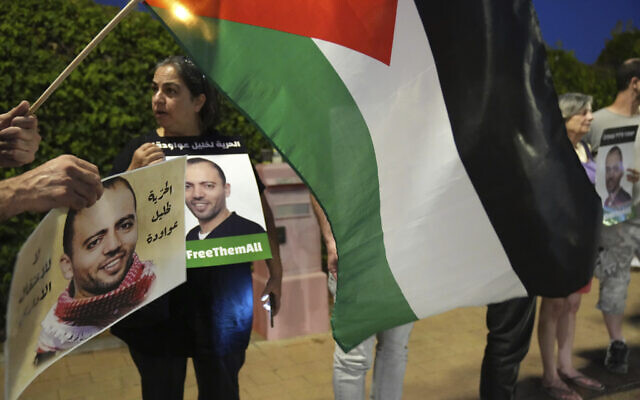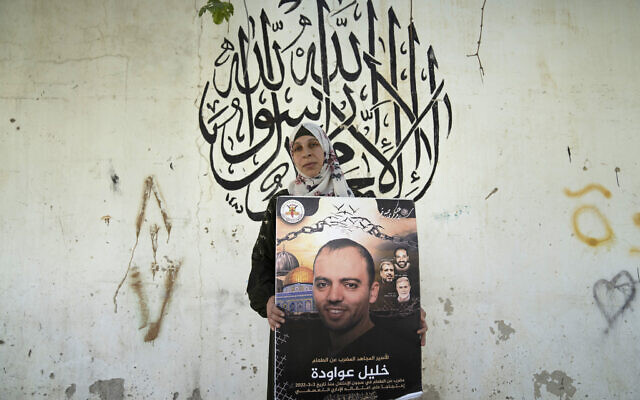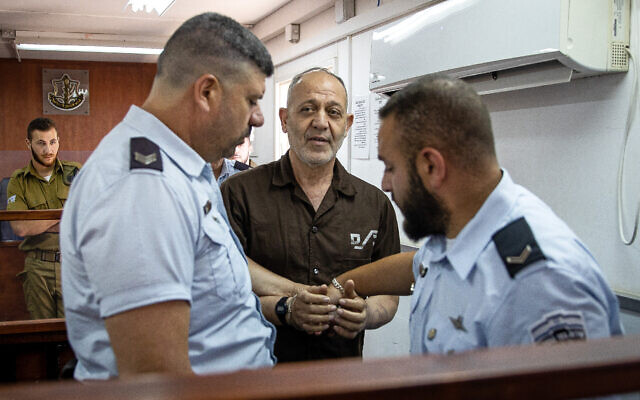Terror suspect Khalil Awawdeh, fasting since March, had administrative detention frozen, but not lifted, while in hospital; judges cite ‘solid’ justification for his arrest

Israel’s High Court of Justice on Sunday rejected an appeal to fully cancel the administrative detention of a Palestinian whose health rapidly deteriorated, after going nearly six months without food.
A military court on Friday temporarily suspended the detention of Khalil Awawdeh to allow him to receive medical care at an Israeli hospital with no restrictions, but said he would be rearrested once his condition was better and he could return to jail.
In its decision Sunday, the High Court stated that it had “no justification” to intervene in the matter, after Awawdeh’s detention was frozen as long as he remains at the Shamir Medical Center in central Israel.
The judges wrote that they had reviewed classified information regarding Awawdeh and had spoken to a defense official, which they said allowed them to determine there was “solid” evidence justifying his administrative detention.
Lawyers for Awawdeh have said he would keep his 170-day fast going until he is granted a full release.
The judges also stated they received a medical opinion regarding Awawdeh, which said his condition was serious, as he refused medical attention, but also that he showed a willingness to receive urgent care if his condition were to deteriorate further.
الأسير خليل عواودة للميادين: مستمر بإضرابي عن الطعام رغم تعبي.. والإسناد الشعبي يقويني.
شخص يحارب الكيان الإسرائيلي بجسده الهزيل يستحق منا كل الدعم.#الحرية_لخليل_عواودة ❤️❤️ pic.twitter.com/m7YHXWWuBw— فاطمة فتوني | Fatima ftouni (@ftounifatima) August 20, 2022
Israel says Awawdeh, 40, is a member of a terror group, an allegation he has denied through his lawyer, and no formal charges have ever been brought. The Palestinian Islamic Jihad terror group demanded his release as part of an Egyptian-brokered ceasefire ending three days of heavy fighting in the Gaza Strip earlier this month, but it did not identify him as a member.
Ahlam Haddad, Awawdeh’s lawyer, has said her client’s health was deteriorating and he was seeking to be released.

Awawdeh, a father of four, is one of several Palestinian prisoners who undertook prolonged hunger strikes over the years to protest so-called administrative detention, which allows Israel to hold prisoners without charge practically indefinitely.
Israel says the policy helps keep dangerous terrorists off the streets and allows the government to hold suspects without divulging sensitive intelligence. Critics say the policy denies prisoners due process. The detentions must be renewed by a military court every six months, and prisoners can remain in jail for years under the mechanism.
Freezing his detention effectively means he is no longer guarded at the hospital by Israel Prison Service guards, and his family will be able to visit him more freely.
Haddad said her client had not eaten since March 4, except for a 10-day period in which he received vitamin injections. The Shin Bet security service did not comment on his case.
Islamic Jihad has also demanded the release of a second prisoner — Bassem Saadi, who the IDF on Sunday said would be soon charged over being a member of the terror group. The arrest earlier this month of Saadi, the Islamic Jihad’s leader in the West Bank, sparked an intense round of fighting in Gaza.

Israel is currently holding some 4,400 Palestinian prisoners, among them terrorists who have carried out deadly attacks as well as people arrested at protests or for throwing stones.
Around 670 Palestinians are currently being held in administrative detention, a number that jumped in March as Israel began near-nightly arrest raids in the West Bank following a spate of deadly terror attacks against Israelis.
Israel says it provides due process and largely imprisons those who threaten its security, though a small number are held for petty crimes.
Palestinians and human rights groups say the system is designed to quash opposition and maintain permanent control over millions of Palestinians while denying them basic rights.
As reported by The Times of Israel
